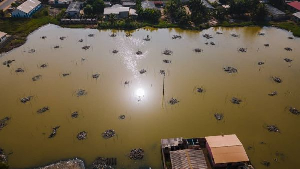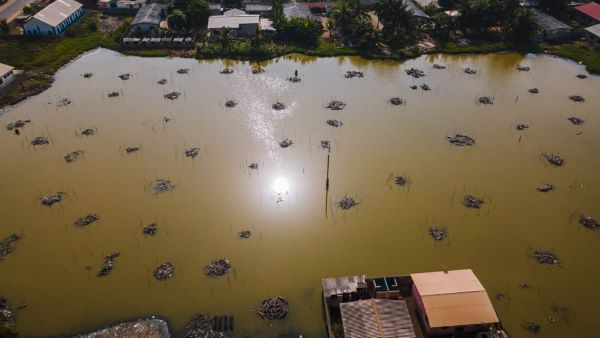 Restoration of mangroves serves as a buffer for coastal erosion
Restoration of mangroves serves as a buffer for coastal erosion
The devastating effects of rising sea levels, coastal erosion, and dwindling fish stocks in Kedzi, a coastal town in the Keta Municipal Assembly of the Volta Region has become an issue of great concern for climate change and sustainability.
It is in this light that Green Growth Africa (GGA) is making strides in strengthening the resilience of Ghana’s coastal communities against climate change through its Coastal Resilience and Sustainable Livelihood Initiative (CRESLI).
The initiative which was launched in October 2024, seeks to address the effects of climate change in Kedzi.
A key component of the project has been the restoration of mangroves, which serve as a natural buffer against coastal erosion, support biodiversity, and help mitigate climate change.
“All over the world, mangroves are disappearing, yet they are one of the most effective natural solutions to coastal protection,” said Allan Amoako-Gyedu, Director of Strategy for Green Growth Africa.
“Through this initiative, we are restoring these vital ecosystems and ensuring that communities understand their importance in tackling climate change,” he told journalists.
To reinforce this effort, GGA has organised sensitisation workshops and actively involved community members in replanting and rehabilitating degraded mangrove areas.
With climate change impacting fishing activities, many women who depend on the trade for their livelihoods are struggling to make ends meet. To help ease this burden, GGA has been training women—particularly fishmongers and traders—in beekeeping, soapmaking, and confectionery production, providing them with sustainable sources of income.
“The project aims to alleviate the challenges faced by coastal residents, who continue to experience the harsh impacts of climate change,” said Candy Darkwa, Programmes Manager for Green Growth Africa.
“By equipping them with alternative livelihood skills, we are helping them build resilience and economic independence,” she added.
Beyond skills training, GGA has also introduced technologically efficient ovens to help women reduce their exposure to harmful smoke from traditional cooking methods and ease the physical strain of their work.
The Queen of Fishmongers of Kedzi, a key community leader, expressed her gratitude for the initiative.
“This project has already made a big impact on our lives. We will ensure that the ovens provided are properly maintained, and with the knowledge we have gained on mangrove conservation, we will work to protect these critical ecosystems,” she said.
For residents of Kedzi, the CRESLI project has been more than just an intervention—it has provided a sustainable pathway to climate adaptation.
“There is nothing more fulfilling than seeing lives transformed,” said Antonio Yayrator Korkuvi, Project Lead for CRESLI.
He added, “The training in alternative livelihoods is not just about economic survival; it’s about empowering residents to take charge of their future in the face of climate change.”
UG professor bemoans effects of heat on mental health of farmers, students, Ghanaians
